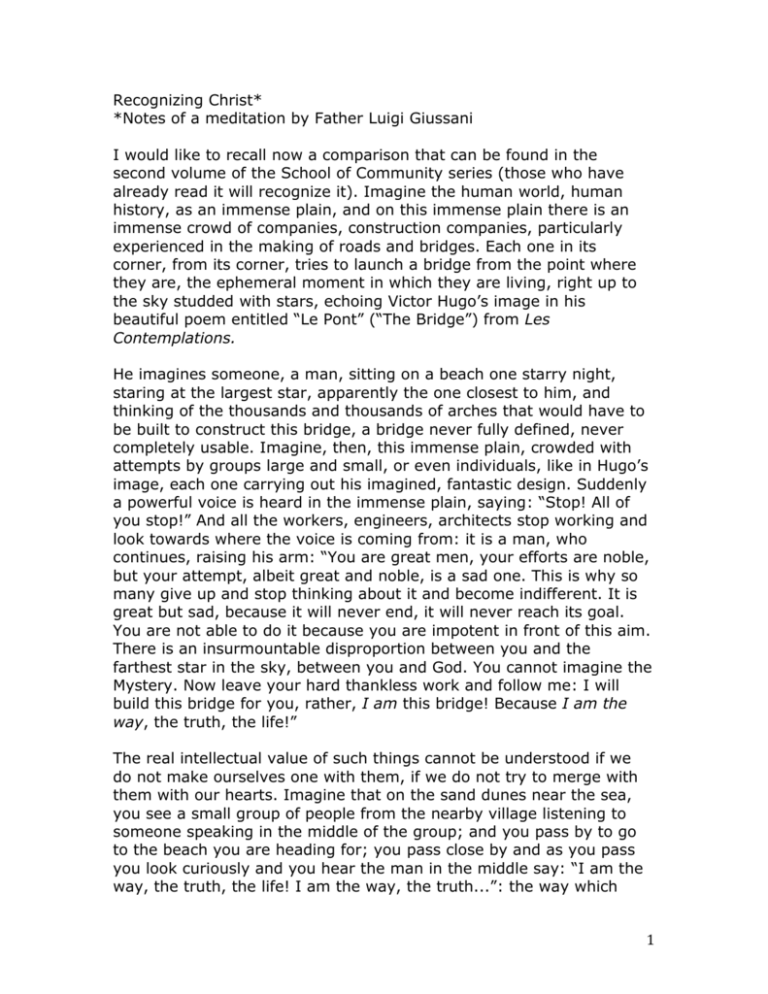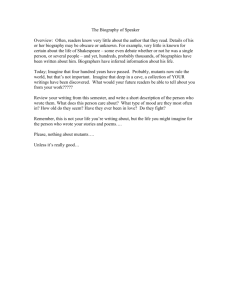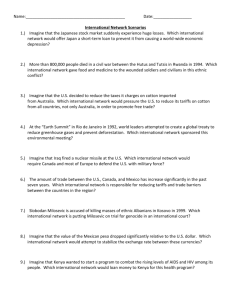Giussani`s speech - Stjohns
advertisement

Recognizing Christ* *Notes of a meditation by Father Luigi Giussani I would like to recall now a comparison that can be found in the second volume of the School of Community series (those who have already read it will recognize it). Imagine the human world, human history, as an immense plain, and on this immense plain there is an immense crowd of companies, construction companies, particularly experienced in the making of roads and bridges. Each one in its corner, from its corner, tries to launch a bridge from the point where they are, the ephemeral moment in which they are living, right up to the sky studded with stars, echoing Victor Hugo’s image in his beautiful poem entitled “Le Pont” (“The Bridge”) from Les Contemplations. He imagines someone, a man, sitting on a beach one starry night, staring at the largest star, apparently the one closest to him, and thinking of the thousands and thousands of arches that would have to be built to construct this bridge, a bridge never fully defined, never completely usable. Imagine, then, this immense plain, crowded with attempts by groups large and small, or even individuals, like in Hugo’s image, each one carrying out his imagined, fantastic design. Suddenly a powerful voice is heard in the immense plain, saying: “Stop! All of you stop!” And all the workers, engineers, architects stop working and look towards where the voice is coming from: it is a man, who continues, raising his arm: “You are great men, your efforts are noble, but your attempt, albeit great and noble, is a sad one. This is why so many give up and stop thinking about it and become indifferent. It is great but sad, because it will never end, it will never reach its goal. You are not able to do it because you are impotent in front of this aim. There is an insurmountable disproportion between you and the farthest star in the sky, between you and God. You cannot imagine the Mystery. Now leave your hard thankless work and follow me: I will build this bridge for you, rather, I am this bridge! Because I am the way, the truth, the life!” The real intellectual value of such things cannot be understood if we do not make ourselves one with them, if we do not try to merge with them with our hearts. Imagine that on the sand dunes near the sea, you see a small group of people from the nearby village listening to someone speaking in the middle of the group; and you pass by to go to the beach you are heading for; you pass close by and as you pass you look curiously and you hear the man in the middle say: “I am the way, the truth, the life! I am the way, the truth...”: the way which 1 cannot be known, the way Kafka was talking about: “I am the way, the truth, the life.” Imagine, make an effort of the imagination, of fantasy: what would you do, what would you say? No matter how skeptical you are, you cannot but prick up your ears, attracted by something coming from that direction, and, at the very least, you look very curiously at that man who is either mad or is telling the truth: tertium not datur; either he is mad or he is true. As a matter of fact, he is so true that there has been only one man, only one, who has said this, one in the whole history of the world—of the world! A man in the midst of a small group of people, often in the midst of a small group but often amidst a big crowd, too. So, everyone in the plain stops working to listen carefully to this voice, and he keeps repeating the same words. Who were the first to be annoyed by all this? The engineers, architects and owners of the construction companies, who said, practically immediately: “Come on, men, back to work! Workers, back to your jobs! That man’s just a braggart!” He was a radical alternative, tranchant, to their project, to their creativity, their earnings, their power, their name, to themselves. He was the alternative to themselves. After the engineers, architects, and bosses, so too the workers more reluctantly dragged their eyes away from the man, beginning to laugh a bit, talking about him for a while, making fun of him or saying, “Who knows, who knows who he is, could he be mad?” But some of them did not. Some heard a tone they had never heard before, and they did not answer the engineer, architect, or building contractor who said to them: “Come on, hurry up, what are you doing here, what are you still looking at over there?” Instead, they kept looking at the man. And he came forward. Or rather, they went toward Him. Out of 120 million people, there were twelve who did this. But it happened: this is an historical fact. What Kafka says (“there is no way”) is not historically true. Paradoxically, one could say, it is true theoretically, but it is not true historically. The mystery cannot be known! This is true theoretically. But if the mystery knocks on your door... “If anyone hears my voice and opens the door, I will enter his house and dine with him,”are words you can read in the Bible, the word of God in the Bible. But it really happened. The first chapter of the Gospel of St John, which is the first page in literature to speak of it, along with the general announcement—“The Word was made flesh,” that of which all reality is made was made man—contains the memories of those who followed Him immediately, who resisted the urgency imposed on them by the engineers and architects. On a piece of paper, one of them noted his first impressions 2 and what the first moment was like when it happened. Indeed the first chapter of John contains a series of notes which are precisely that, notes from memory. One of the two men, in his old age, read in his memory the notes that remained there. Because memory has its own law. The law of memory is not a continuity without gaps, as for example in a creation of fantasy, of the imagination: memory literally “takes notes,” like we do now: a note, a line, a point, and this point covers lots of things, so that the second phrase starts out from the many things supposed by the first point. Things are supposed more than said, some are only said as points of reference. So that I at my 70 years of age reread them for the thousandth time, without any trace of tiredness. I challenge you to imagine anything that is more serious, more weighty, in the sense of pondus, greater, more charged with challenge for human existence in its apparent fragility, more pregnant with consequences in history, than this fact which happened. “The next day John was there again with two of his disciples, and as he watched Jesus walk by he said...” Imagine the scene, then. After 150 years of waiting, the Hebrew people who, throughout their whole history, for two thousand years, had always had some prophet, someone recognized by all as a prophet, after 150 years, they finally had a prophet again: he was called John the Baptist. Other writings from antiquity speak of him, so he is historically documented. Everyone—rich and poor, publicans and Pharisees, friends and foes— went to hear him and to see how he lived, beyond the Jordan, in the desert, feeding on locusts and wild herbs. He always had a group of people around him. Among these people that day were also two who were there for the first time and had come, we would say, from the country—really they came from the lake, which was quite far away and outside the area of the developed cities. They were there like two villagers who have come to the city for the first time, a bit lost, and they looked at everything around them wide-eyed, especially at him. They were there with their mouths open and their eyes popping out, looking at him, listening to him, so attentively. Suddenly someone in the group, a young man, sets out, taking the path along the river heading north. And John the Baptist, fixing his gaze on him, shouts: “Behold the Lamb of God, behold the one who takes away the sins of the world!” But the people did not move; they were used to hearing the prophet come out every once in a while with strange, incomprehensible, unconnected phrases, out of context; so most of them took no notice. The two who were there for the first time and were hanging on his every word and watching his eyes, looking wherever he looked, saw that John was staring at the man who was 3 leaving, and they set off at His heels. They followed Him at a distance, timid and ashamed, but strangely, profoundly, obscurely curious, intrigued. “The two disciples heard what he said and followed Jesus. Jesus turned and saw them following Him and said to them, ‘What are you looking for?’ They said to him, ‘Rabbi, where are you staying?’ He said to them, ‘Come, and you will see.’” This is the formula, the Christian formula. This is the Christian method: “Come and see.” “So they went and saw where He was staying, and they stayed with Him that day. It was about four in the afternoon.” It does not specify when they left, when they followed Him; the whole passage and the following one are made up of notes, as I said before; the sentences end at a point which takes for granted that many things are already known. For example: “It was about four in the afternoon;” does this mean when they left, or when they went there, who knows? In any case, it was four in the afternoon. One of the two who had heard the words of John the Baptist and followed Him was named Andrew; he was Simon Peter’s brother. The first person he met was his brother Simon coming back from the beach—he was coming back from fishing or from mending his fishing nets—and he said to him: “We have found the Messiah.” He doesn’t narrate anything, doesn’t say what anybody said, doesn’t furnish proof, it is well-known, it is clear, these are notes about things that everybody knows! Very few pages can be read that are so realistically true to life, so simply true to life, where not one word has been added to pure reminiscence. How could he say: “We have found the Messiah”? Jesus, in talking to them, would have used this word, which was part of their vocabulary; because saying that this man was the Messiah, “just like that” so convincedly, would have been impossible. But it is evident that staying there listening to this man for hours and hours, seeing Him, watching Him speak—who could speak like that? Who had ever talked like that? Who had said those things? They were unheard of! No one had ever seen anyone like that!—slowly within their minds the idea was growing: “If I don’t believe this man I’ll never believe anybody, not even my own eyes.” Not that they said it, not that they thought it, they felt rather than thought it. So that man must have said, among other things, that He was the one who was to come, the Messiah who was to come. But the exceptionality of the proclamation made it so obvious that they came away with that statement as though it were something simple—it was simple!—as though it were something easy to understand. 4 “He brought Simon to Jesus, who looked at him and said, ‘You are Simon son of John; you shall be called Cephas’ (that is, Peter, ‘the Rock’).” It was a Jewish custom to give someone a new name to indicate their character or commemorate something that happened. So, imagine Simon who goes with his brother, full of curiosity and some fear, and he stares at the man his brother has brought him to see. That man is also staring at him while he is still far away. Think of how He is staring at him, to the point that He has understood his character to the very marrow of his bones: “You will be called Rock.” Think of how someone feels when looked at like that by someone new, a complete stranger, grasped to the depths of his being. “The next day Jesus decided to leave for Galilee...” The rest you can read for yourselves. It is half a page like this, made up of brief notes and these points in which it is taken for granted that everyone knew everything that had happened, that it was evident to all. “There is a point of arrival, but no way.” No! A man who said: “I am the way” is an historical fact which happened, first described in this half page that I have started to read. And every one of us knows that it happened. Nothing in the world ever happened that was as unthinkable and exceptional as the man of whom we are speaking: Jesus of Nazareth. But those two, the first two, John and Andrew—Andrew was most probably married with children—how was it that they were won over so quickly and recognized Him (there is no other word that can be used, than “recognize”)? I would say that if this fact happened, recognizing that man, who that man was, not who He was in detail, in the depths of His being, but recognizing that this man was something exceptional, out of the ordinary—He was absolutely out of the ordinary—irreducible by any form of analysis, recognizing this must have been easy. If God became man and came among us, if He came now, if He slipped into our crowd, and were here now among us, recognizing Him, I say a priori, should be easy: easy to recognize Him as divine. Why is it easy to recognize Him? Because of an exceptionality, an exceptionality beyond compare. I have in front of me an exceptionality, an exceptional man, beyond compare. What does exceptional mean? What can it mean? Why does the exceptional strike you? Why do you feel something “exceptional” to be exceptional? Because it corresponds to the expectations of your heart, no matter how confused and nebulous they might be. It corresponds unexpectedly—unexpectedly!—to the needs of your mind or your heart, to the irresistible, undeniable demands of your heart in a way you could never have imagined or predicted, because there is no one like this man. The exceptional is, paradoxically, the appearance of 5 what is most natural for us. What is natural for me? That what I want happens. More natural than this! That what I most want most happens: this is natural. To come across something totally, profoundly natural, because it corresponds to the demands of the heart that nature gave us, is something absolutely exceptional. It is like a strange contradiction: what happens is never exceptional, truly exceptional, because it does not succeed in responding adequately to the heart’s demands. We approach exceptionality when something makes the heart beat for a correspondence that we think is valuable and that the events of tomorrow will retract and next year annul. It is the exceptionality with which the figure of Christ appears that makes it easy to recognize Him. We must imagine ourselves, as I said before, we must submerge ourselves in these events. If we try to judge them, if we want to judge them, I don’t say understand them, but judge them substantially, as true or false, it is the sincerity of your identification with them that makes the true true and not false, and does not make your heart doubt the truth. It is easy to recognize it as a divine ontology because it is exceptional: it corresponds to the heart, and you stay with it and never want to leave—which is the sign of a correspondence with the heart. One would never leave, and would follow Him for one’s whole life. And in fact they followed Him for the three more years that He lived. But imagine those two who stay there listening to Him for hours and then they have to go home. He says goodbye to them and they go their way silently, silent because full of the impression they have received of the felt mystery, about which they had had a feeling beforehand and then they had actually felt. And then they separate. Each of the two goes to his own house. They don’t say goodbye, not because they don’t say goodbye but because they bid each other farewell without saying goodbye, because they are both full of the same thing, the two of them are one, so full are they of the same thing. And Andrew goes into his house and puts his cloak down, and his wife says: “Andrew, what’s wrong with you? You’re different, what happened?” Imagine that he burst into tears in her arms, and that she, upset by all this, continued to ask him: “But what’s wrong?” And he holding his wife, who had never felt herself held that way before: he was a different person. He was a different person! He was the same, but he was different. If anyone had asked him: “Who are you?” he would have said: “I understand that I have become someone else... after hearing that person, that man, I have become another person.” My friends, without going too much into it, this happened. 6 Not only is it easy to recognize Him, it was easy to recognize Him in His exceptionality—because “if I don’t believe this man then I don’t even believe my own eyes any more”— but it was easy to understand what type of morality, that is, what type of relationship was born with Him; because morality is the relationship with reality insofar as it is created from the Mystery that made it, it is the proper, orderly relationship with reality. It was easy, for them it was easy to understand how easy the relationship with Him was, how easy it was to follow Him, to be consistent with what He was, to be consistent with His presence— consistent with His presence. 7







